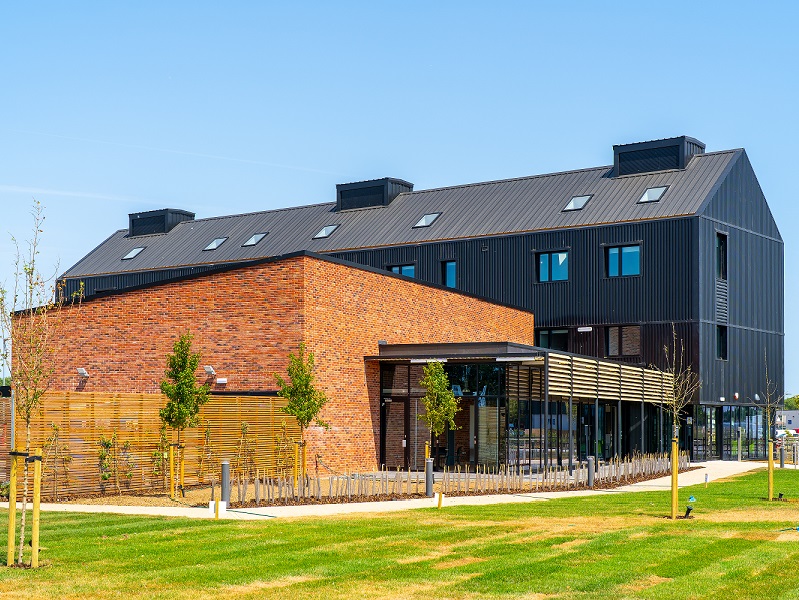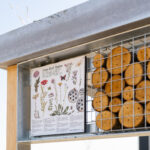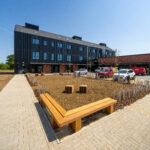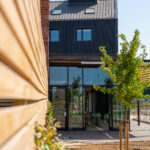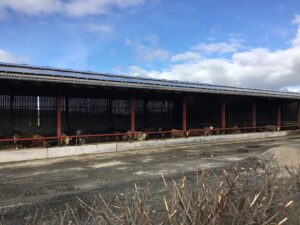Investment in innovation and new business within the agri-food sector is crucial in delivering national food security, according to key stakeholders in Lincolnshire’s newest strategic space.
The latest of three Food Enterprise Zones (FEZs), the South Lincolnshire FEZ (FEZ) in Holbeach is a £16m investment which offers start-ups and SMEs in the agri-tech and food sector an array of specialised and collaborative spaces, as well as access to tailored business support.
Already in situ are new purpose-built facilities including the University of Lincoln’s National Centre of Food Manufacturing, as well as the Lincolnshire Institute of Technology, and The Hub.
The South Lincolnshire FEZ is located in the heart of the UK Food Valley – an ambitious project pioneering sustainability through innovation – and is a partnership between Lincolnshire County Council (LCC), Greater Lincolnshire Local Enterprise Partnership (LEP), South Holland District Council, and the University of Lincoln (UoL).
“As a partnership we’ve mobilised energy and resources into the development,” says Simon Wright, regeneration and portfolio officer at LCC. “We are at a real time of need for British food and farming. A challenging economy, food security and environmental ambitions mean we need to invest to collaborate, innovate, and deliver. The South Lincolnshire FEZ shows our dedication and commitment – as a council and a partnership – to the agri-food sector, which is currently the fastest growing sector in the county and the UK.”
Greater Lincolnshire has a robust tradition in farming and food: It has a total agricultural output worth over £2bn, which represents 12% of England’s total agricultural production (2019), with the food supply chain providing 24% of jobs in the region, compared to 13% nationally.
The region is therefore strategically and nationally important to food security, says Councillor Colin Davie, executive councillor for economy and place at LCC. “Agriculture and food, from field to fork, is considerably concentrated in the area – growing 30% of the nation’s vegetables and 18% of its poultry. Having three food industry clusters underlines the region’s strategic national importance as a food producer,” he explains.
“Food security will go up the agenda, and the UK will have to grow more of its own produce. The South Lincolnshire FEZ has been designed to put food production, packaging, and delivery at the top of the Government’s agenda.”
Cllr Davie also welcomes sustainable energy production into the fold. “Food processing and packaging are energy-intensive industries, and we want to see innovation and development around sustainable energy generation for the agri-food industries.
“We need to be a lot more secure in terms of energy and food, and the best way of doing that is by investing in sites like this that will innovate and prepare for future generations.”
Being in the South Holland District of Lincolnshire, the South Lincolnshire FEZ is at the heart of a fresh produce cluster and the UK Food Valley, says Greater Lincolnshire LEP’s Food Board Chair, Sarah Louise Fairburn.
“The district has 42% of its jobs in agriculture, food processing and related industries like food logistics, which makes the South Lincolnshire FEZ a key component in delivering sustainable growth throughout the food supply chain, with the Hub acting as a focal point to promote industry collaboration,” she explains.
The South Lincolnshire FEZ is ideally located with the advantage of its development plots for purpose-built facilities having pre-secured outline planning permission, with The Hub offering pre-built flexible office and R&D space – supported by an internationally renowned R&D team.
“And businesses taking up a tenancy either on a development plot or within The Hub will have access to a fantastic wealth of academic and industry-related R&D in the Holbeach cluster,” adds Ms Fairburn.
The Hub is sited next to the UoL’s National Centre for Food Manufacturing and the new Lincolnshire Institute of Technology – which focuses on digital skills for the food chain.
“The UoL runs numerous programmes supporting product development, automation, and R&D, and works closely with industry to build the skills required through apprenticeships and targeted qualifications,” says Ms Fairburn. “The ambition is that The Hub will also be home to networking and bespoke events to support South Lincolnshire FEZ tenants and the food sector.”
The investment isn’t just in the bricks and mortar, adds Cllr Davie. “By giving businesses direct access to programmes and support from Business Lincolnshire’s Growth Hub advisors and the UoL, businesses can get tailored support and develop long-term sustainable business models.”
This will help economic growth by tackling skills and growing the cluster through supported, affordable tenancies, says Ms Fairburn. “Since 2016 there has been over £2.25bn invested in the food chain in Lincolnshire, creating over 7,000 jobs, and we believe this is just the start of what is really possible in the next decade.
“We believe that the future needs more collaboration between innovation providers and end users, as well as across the food supply chain, and we look forward to the South Lincolnshire FEZ playing a key role in forging and supporting new collaborations.”



